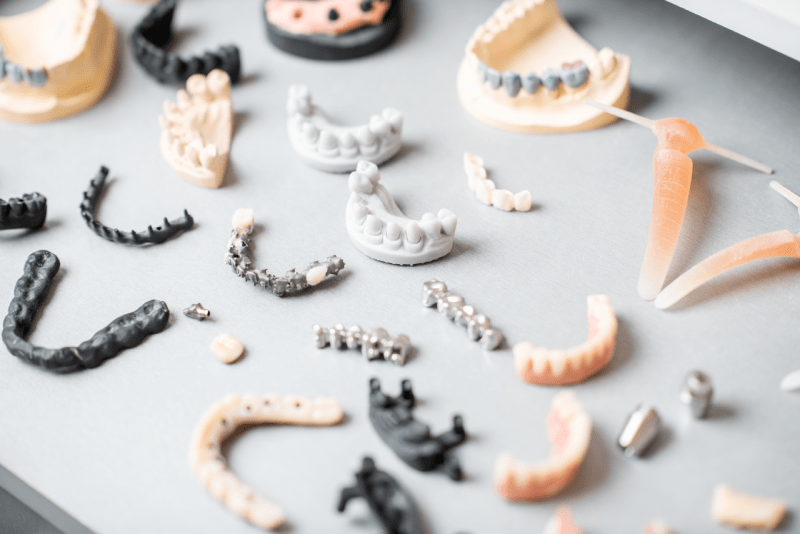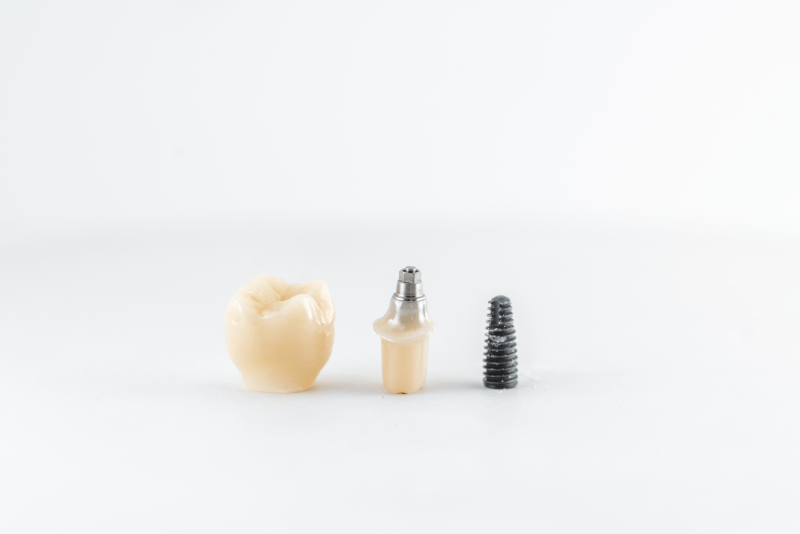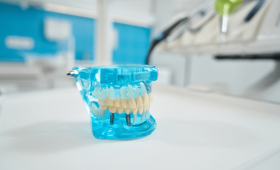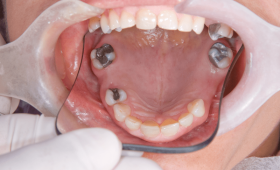What is a Dental Implant?
A dental implant is an artificial tooth root, typically made of titanium, surgically placed into the jawbone to replace missing teeth. It fuses with the jawbone to create a stable support point, allowing a prosthetic tooth (crown) to be placed on top. Implants look, feel, and function just like natural teeth.
Parts of an Implant
A dental implant system consists of three main parts:
- Implant Body (Screw): The titanium screw placed inside the jawbone that mimics a real tooth root. It is the foundation of the implant.
- Abutment (Connector Piece): The intermediate piece that connects the implant screw to the prosthetic tooth that will be placed on top.
- Prosthetic Tooth (Crown): The artificial tooth that looks like a natural tooth and is placed on the abutment.
Who is a Suitable Candidate?
Dental implants are suitable for almost anyone with missing teeth and good general health. However, some basic criteria must be met to be a suitable candidate:
- Sufficient Jawbone: To ensure successful integration of the implant, there must be sufficient bone volume and density in the area where it will be placed. If the bone is insufficient, bone augmentation (bone grafting) procedures can be performed before the implant.
- Good General Health: Conditions such as serious heart diseases, uncontrolled diabetes, or immune system disorders can affect implant success.
- Good Oral Hygiene: Regular and good oral hygiene care is essential for the longevity of implants.
- Smoking: Smoking can negatively affect the healing process of the implant and increase the risk of failure. It is recommended to quit or reduce smoking before getting an implant.
- Age: Suitable for individuals whose jawbone development is complete. Therefore, it is generally applied to individuals aged 18 and over.
The Dental Implant Process
The implant process consists of several stages:
- Examination and Planning: The dentist evaluates whether your jawbone is suitable for an implant by performing an intraoral examination, taking X-rays, and a CT scan. A personalized treatment plan is created for you.
- Surgical Procedure: The implant screw is placed into the jawbone under local anesthesia. This procedure is usually completed painlessly and quickly.
- Healing Period: A period of 2 to 6 months is waited for the implant to fully fuse with the jawbone (osseointegration). A temporary prosthesis can be placed on the implant during this period.
- Abutment Placement: After healing is complete, the connector piece called the abutment is attached to the implant.
- Placement of the Prosthetic Tooth (Crown): After the gum has healed, a permanent prosthetic tooth, prepared from a mold, is placed on the abutment.
Advantages of a Dental Implant
- Aesthetic Appearance: Implants look and feel like natural teeth.
- Functional Use: They fully restore speech and chewing functions.
- Bone Preservation: They help preserve facial structure by preventing bone loss in the missing tooth area.
- Durability: With proper care, they can last a lifetime.
- Comfort: Unlike removable dentures, implants are fixed in the mouth and do not cause discomfort.
Risks of Implant Treatment
Although implant treatment is generally very safe, it carries some risks, as with any surgical procedure:
- Infection: There is a risk of infection due to insufficient oral hygiene after the procedure.
- Nerve Damage: Although rare, temporary numbness in the lip, tongue, or chin may occur if the implant is placed close to a nerve.
- Sinus Problems: Problems may arise in the upper jaw if the implant is placed close to the sinus cavity.
Types of Dental Implants and Application Methods
Dental implants are artificial tooth roots used to replace missing teeth. They are typically made from titanium or zirconium and are surgically placed into the jawbone. Dental implants provide a permanent and natural solution, helping patients regain their chewing function and aesthetic appearance.
Types of Dental Implants by Material
Titanium Implants
Titanium is the most commonly used material in implantology. Thanks to its excellent compatibility with the body (biocompatibility), titanium implants form a strong foundation by fusing with the bone (osseointegration). They are lightweight, durable, and resistant to corrosion.
Zirconium Implants
Zirconium is a ceramic-based material used as an alternative to titanium. Its white color offers an aesthetic advantage, especially for front teeth. It is an ideal option for patients with metal allergies or those who do not want to use metallic materials. Zirconium is as strong and biocompatible as titanium.
Types of Dental Implants by Application Method
Endosteal Implants
This is the most common type of implant. They are surgically placed directly into the jawbone. They are ideal for patients who have sufficient bone density and volume in their jaw. They can consist of titanium screws, cylinders, or blade-like structures.
Subperiosteal Implants
These implants are placed on top of the jawbone but under the gum tissue. They can be preferred for patients with insufficient bone volume. They consist of a metal framework that rests on the jawbone, and the ends of this framework protrude through the gums to provide support for a prosthetic tooth. This method can be an alternative in cases where a bone graft operation is not needed.
Zygomatic Implants
Used in upper jaw patients with very advanced bone loss. Unlike normal dental implants, these implants are placed in the cheekbone (zygoma). This method eliminates the need for extensive bone graft operations.
Implant Types by Treatment Process
Traditional Implant
This method is a two-stage process. In the first stage, the implant is placed in the jawbone, and a waiting period of 3 to 6 months is observed for healing. During this process, the implant is fully fused with the bone. In the second stage, a prosthetic tooth is attached to the implant.
Single-Session Implant (Immediate Load)
In patients with suitable bone structure, a temporary prosthetic tooth can be attached immediately after the implant is placed. This shortens the patient’s toothless period and offers an aesthetic solution. The permanent prosthesis is attached after the healing process is complete.
Implant Types by Purpose of Use
Single Tooth Implant
Used in cases where only one tooth is missing. A single crown is placed on the implant.
Implant-Supported Bridge
In cases where multiple adjacent teeth are missing, a bridge is placed on two or more implants. This method fills the gap without harming the neighboring healthy teeth.
All-on-4 Implant Technique
A technique that involves placing a fixed prosthesis on typically four implants in cases where an entire jaw is toothless. This method can be used in both the upper and lower jaw and provides the patient with a fixed set of teeth.

Why Choose Istanbul for Dental Implants?
Istanbul has become an attractive destination for those seeking dental implant treatment. Combining quality healthcare services with cultural richness, this city offers many advantages. Here are the main reasons why you should choose Istanbul:
Economic Advantages
Dental implant treatment in Istanbul is much more affordable compared to prices in Western Europe and the United States. This price difference does not mean a compromise in service quality. On the contrary, thanks to lower living costs, operational expenses, and a favorable exchange rate, you can access the same quality of treatment at a more reasonable price.
Experienced and Expert Physicians
Turkey is home to many talented dentists who have received internationally recognized education and are specialized in modern dentistry techniques. Dentists in Istanbul can often communicate in foreign languages and offer special services to international patients. This expertise is of critical importance for a successful treatment.
Advanced Technology and Modern Clinics
Dental clinics in Istanbul are equipped with state-of-the-art technology and modern facilities. Advanced technologies such as digital imaging, 3D tomography, and computer-assisted implant applications are actively used in treatment processes. This makes the treatment process faster, more comfortable, and safer.
Short Waiting Times
Turkey’s healthcare system is very fast and flexible in terms of appointments and treatment processes. Instead of waiting for months as is common in some other countries, you can get your appointment in Istanbul more quickly and don’t have to wait long for your treatment to begin. This is a significant advantage, especially for patients with limited time.
Opportunity to Combine Tourism and Treatment
Istanbul is a world-renowned tourism hub with its historical buildings, magnificent views, and vibrant culture. In addition to your dental implant treatment, you can visit historical sites like Hagia Sophia, Topkapi Palace, and the Grand Bazaar, take a Bosphorus cruise, and experience the city’s unique atmosphere. This way, you can turn the treatment process into a relaxing and exploratory vacation.
Easy Transportation
Istanbul is an important transportation hub connecting Europe and Asia. Thanks to major airports like Istanbul Airport (IST) and Sabiha Gokcen Airport (SAW), you can easily reach the city with direct flights from all over the world.
Choosing Istanbul for your dental implant treatment is a great opportunity to receive high-quality healthcare and have an unforgettable travel experience.
How Much Do Dental Implants Cost in Istanbul?
It’s very natural that you’d want information about dental implant costs in Istanbul, as the costs can vary quite a bit depending on several factors.
According to my research, the average cost for a single dental implant in 2024 and 2025 ranges between €300 and €1,500, depending on the materials and brand used. Prices generally differ based on local, Korean, German, and Swiss implant brands.
Main Factors Affecting the Price
- Brand and Quality of the Implant: Swiss brands like Straumann and Nobel Biocare are typically more expensive, while local or Korean brands can be more affordable.
- Clinic Location and Dentist’s Experience: Clinics located in central Istanbul and those with experienced surgeons may charge higher fees.
- Additional Procedures: If there is insufficient bone tissue in the area where the implant will be placed, additional procedures like bone grafting may be necessary. This also increases the total cost.
- Scope of Treatment: There are significant price differences between a single tooth implant and a full-arch implant treatment (such as All-on-4 or All-on-6). For full-arch treatments, prices can start from €2,500 and go much higher.
Istanbul’s dental clinics are often preferred by both local and international patients because their prices are much more affordable compared to those in Europe and the USA. This situation has made Turkey a center for health tourism.
Dental Implant Cost Comparison
Istanbul has become a prominent hub for dental tourism, thanks to its advantageous exchange rates, lower labor costs, and high-quality standards. This allows for dental implant treatments to be offered at much more affordable prices compared to Western countries. However, it’s important to note that prices can vary significantly depending on the implant brand used, the surgeon’s experience, the clinic’s location, and the need for additional treatments (such as bone grafting, sinus lifting, etc.).
| Country | Average Price Range (Single Implant) | Description |
|---|---|---|
| Turkey (Istanbul) | $300 – $1.200 | This price usually includes the entire process (examination, implant, and prosthesis). |
| United States (USA) | $3.000 – $6.000 | Prices vary greatly by state, and additional costs may apply. |
| United Kingdom (UK) | €3.600 – €5.800 | Prices generally do not include additional treatments or prostheses. |
| Germany | €2.000 – €3.500 | Known for high quality standards and detailed procedures. |
| Other European Countries | €1.500 – €4.000 | Prices differ by country and clinic. |
All-Inclusive Dental Implant Packages in Istanbul
Istanbul has become a popular destination worldwide for dental treatments, especially dental implant procedures, thanks to its modern medical facilities and affordable prices. “All-inclusive” packages aim to make the process more transparent and easier for patients by covering accommodation, transfers, and other expenses throughout the treatment. These packages typically include the following services:
- Initial Examination and Consultation: A detailed oral examination by a specialist dentist, including X-rays and treatment planning.
- Dental Implant Application: The placement of the implant into the jawbone. The package usually includes the number of implants (single tooth, multiple teeth, or full jaw).
- Abutment and Prosthesis: The abutment, which is the part placed on the implant that holds the prosthetic tooth, and the dental prosthesis made from materials like porcelain or zirconia.
- Accommodation: Stays in partner hotels (usually 3 to 5-star hotels) for the duration of the treatment.
- Airport Transfers: Transportation from the airport to your hotel and the clinic.
- Interpreter Services: An interpreter to accompany you throughout the treatment to avoid any language barriers.
Average Prices
The prices of dental implant packages in Istanbul can vary depending on the brand of the implant used, the complexity of the procedure (e.g., whether additional procedures like bone grafting or sinus lifting are needed), and the extra services included in the package. However, to provide a general price range, the average costs for all-inclusive packages in Euros are as follows:
- Single dental implant: Prices can range from €600 to €1,200.
- Full jaw (systems like All-on-4 or All-on-6): Prices can range from €4,000 to €8,000. In these systems, all teeth in one jaw are placed on a few implants.
Please remember that these prices are for general informational purposes only, and a precise quote requires a detailed examination and a personalized treatment plan. Before starting any treatment, it is highly recommended to thoroughly inquire about the services offered by the clinics, the quality of the implants used, and everything included in the package.

The Best Dental Implant Clinics in Istanbul
Istanbul is a city that stands out for the wide range of services it offers in the field of dental health. There are many clinics that bring together modern technology and expert staff, especially for dental implant treatments. Implant treatment provides the most functional and aesthetically suitable solution for replacing missing teeth. The success of this treatment depends on both the quality of the materials used and the clinic’s hygiene and technological infrastructure.
There are some important factors to consider when evaluating good dental implant clinics in Istanbul:
- Technological Infrastructure: The basis of a successful implant treatment is the use of up-to-date technology. Tools such as 3D imaging systems (tomography), digital planning software, and laser-assisted surgery make the treatment process safer and more predictable.
- Hygiene and Sterilization: It is vital for patient health that clinics comply with infection control standards. The sterilization of the environments where surgical operations are performed and the disinfection of the instruments used must be meticulously ensured.
- Material Quality: The brand and origin of the implants used play a critical role in the longevity of the treatment. Clinics that work with internationally accepted and biocompatible materials should be preferred.
- Patient-Oriented Approach: A good clinic has an approach that prioritizes the patient’s needs and expectations, and provides detailed information before and after treatment. The treatment plan is prepared specifically for the patient, and the entire process is managed transparently.
Based on these criteria, prominent clinics in Istanbul in the field of dental implants achieve successful results with their expert staff, modern equipment, and service approach based on patient satisfaction. It is important to get opinions from a few different clinics and choose the one that is best for you before starting treatment.
The Best Implant Dentists in Istanbul
When choosing the best implant dentist in Istanbul, there are a few important points to consider. Each dentist has a different area of expertise and experience. Therefore, finding the right dentist is of great importance for a successful treatment process.
Experience and Areas of Expertise
Implant treatment is a field that requires a special specialization. For this reason, it is important that the dentist you choose has extensive experience in implantology. Dentists who frequently perform implant applications, follow current techniques in this field, and have experience with different types of cases, generally provide more reliable results. In addition, examining the successful treatments the dentist has performed previously and patient feedback can also give you an idea.
Technology and Materials Used
At the core of a successful implant treatment lies the quality of the technology and materials used. Clinics that use current technology can make the treatment process more comfortable and effective. For example, 3D imaging systems, navigation-assisted surgical techniques, and laser-assisted applications can reduce risk by ensuring the implant is placed in the correct location. Furthermore, it is a critical factor for a long-lasting solution that the implant brand and materials used are of high quality and comply with international standards.
Hygiene and Clinic Conditions
The hygiene standards of the clinic where you will be treated are one of the most important elements for your health. You should make sure that sterilization procedures are meticulously applied and that the general cleanliness level of the clinic is high. A modern and well-organized clinical environment makes the treatment process safer and more comfortable.
Communication and Patient Relations
A good implant dentist is not only technically successful, but also establishes strong communication with their patients. Working with a dentist who clearly explains the treatment plan, patiently answers your questions, and keeps you informed throughout the entire process helps you feel confident. Being able to have an honest dialogue about the risks of the treatment, possible side effects, and your expectations will help you achieve the best results.
Is It Safe to Get Dental Implants in Istanbul?
Yes, it is quite safe to get dental implants in Istanbul. Turkey, and Istanbul in particular, has experienced significant growth in the field of health tourism in recent years. One of the most important reasons for this development is the presence of hospitals and clinics that offer high-standard services with modern medical technology.
Dental professionals and implant specialists in Istanbul are typically well-trained and experienced, often meeting international standards. Many clinics operate in compliance with European Union (EU) and United States (US) health standards. The implant materials used are also generally high-quality brands approved by the FDA (U.S. Food and Drug Administration) or with CE (Conformité Européenne) marking.
What to Consider for a Safe Experience
To have a safe and successful dental implant experience in Istanbul, it is important to pay attention to the following:
- Do Your Research: Check the references and patient reviews of the clinic or hospital you are considering.
- Specialist Selection: Verify the experience and specialization of the dentist who will perform the implant procedure.
- Material Quality: Ask for information about the brand and origin of the implants used. Make sure they are high-quality and approved products.
- Price Comparison: Be cautious of places that offer very low prices. Quality service and materials come with a certain cost.


